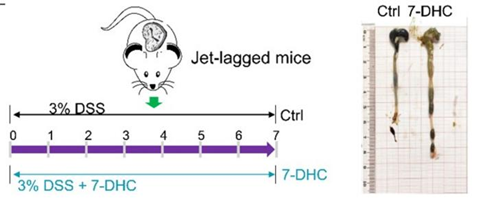Inflammatory bowel disease (IBD) is a chronic inflammatory disease of the gastrointestinal tract categorized into ulcerative colitis and Crohn’s disease.

Currently, aminosalicylates, glucocorticoids, immunomodulating drugs, and biological agents are common strategies for the treatment of IBD. The efficacy of these therapies is limited, however, and they are frequently associated with multiple adverse effects.
Recently, Life Metabolism published a study entitled “7-Dehydrocholesterol protects against circadian disruption and experimental colitis: potential role of RORα/γ”, which shows that gut microbiota-derived metabolite 7-dehydrocholesterol (7-DHC) acts as a circadian rhythm regulator and ameliorates experimental colitis by targeting RORα/γ to combat circadian rhythm disruption (Figure 1).
Gut microbiota metabolites
By screening a library of gut microbiota-derived metabolites with 810 small molecules, the authors found that 7-DHC can regulate circadian rhythms both in vitro and in a jet-lagged mouse model.

Importantly, 7-DHC ameliorates colitis induced by dextran sulfate sodium (DSS) in jet-lagged mice by directly targeting both RORα and RORγ, thereby affecting the expression of the downstream clock genes in a vitamin D-independent manner.
Overall, this study reveals that gut microbiota-derived molecule 7-DHC is a potential therapeutic agent for IBD by modulating circadian rhythm, providing a novel idea for further research and development of novel IBD therapeutics.







No comments yet